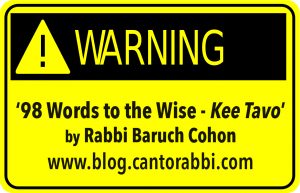98 WORDS TO THE WISE – Kee tavo, Deut. 26-29:8 – by Rabbi Baruch Cohon
This section includes Moses’ Third Discourse, and its famous lists of blessings and curses – blessings earned by carrying out the Divine commandments, and curses incurred by violating them. When this passage is read in traditional Sabbath services, either the rabbi or the Torah Reader himself is called to recite the blessings before and after the reading. In effect, this individual thus represents the entire congregation.
The reader starts chanting the words in full voice, detailing the blessings we can expect from right conduct. For example: “G-d will make you the head and not the tail. You will always be above and never below, when you listen to G-d’s commandments that I give you today.”
And then the reader drops his pitch and his volume, and launches into a list of warnings – disasters we can bring on ourselves. A hush falls on the congregation. Quiet though the reader’s voice is, this grim warning – the Tokhakha –rings out:
“You will be cursed in the city and cursed in the field… cursed in the fruit of your body and in the fruit of your land… G-d will cause you to be struck by your enemies. You will go out against them on one road, and flee from them by seven roads. You will become a horror to all the kingdoms of the earth… You will betroth a woman and another man will violate her. You will build a house and you will not dwell there, plant a vineyard and not use its fruit… Your sons and daughters will be given to another people and your eyes will see and you will ache from losing them but will have no power in your hand… You will become insane from what your eyes will see…”
On and on it goes. Diseases will be brought on by perversion; defeat will result from false pride. The last verses sum up the sufferer’s feeling:
You will not believe in your life. In the morning you will say “if night will only come” and in the evening you will say “when will it be morning?” You will offer yourselves for sale as slaves and maidservants, and no one will buy.
As many commentators observe, the only worse predictions possible would be to describe what really happened in Jewish history.
Truly, this is not the only list of warnings in the Torah. The first one comes at the end of the Book of Leviticus in the section called B’khukotai. Also quite dramatic, it is expressed differently. The very last sentence in Leviticus reminds the people that these were the laws they accepted on Mount Sinai – back in Exodus – or should have accepted. Maybe they fell short, and needed an urgent reminder? This one is super urgent.
The Lubavitcher Rebbe points out that here in Deuteronomy we have twice as many warnings as in Leviticus. There we had 49. Here are 98. Why is this text double length? His answer is fascinating. He says that since B’khukotai is read before the holiday of Shavuot (the Feast of Weeks, or Pentecost) it commemorates receiving the Torah, when the Jewish People occupied the spiritual level of tzadikim – the righteous. Here in Kee tavo, read in the fall, we are preparing for the High Holidays when the goal is t’shuvah –return, or repentance. The Talmud teaches that the true returnee, the baal t’shuvah, occupies a moral position higher even than one who is completely righteous, a real tzadik. Therefore, when preparing for that kind of return, we need more warnings.
And we need to listen. As if welcoming all of us potential returnees, this week’s Haftorah, from Chapter 60 of the prophet Isaiah, starts with the great words:“Kumi ori – Rise and shine for your light has arrived, and G-d’s glory shines on you!” So may it be this year.



